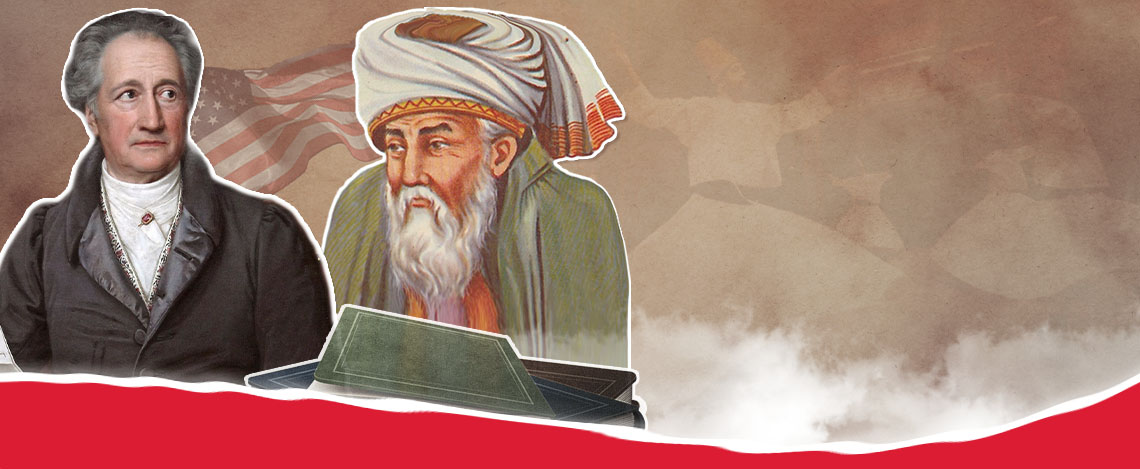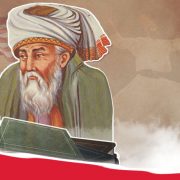Classical German writer Johann Goethe called for a re-synthesis of ‘Weltliteratur’ (or world literature), being a common human production that is universal across cultures. He further called for the removal of any and all superior tendencies in ‘comparative literature.’ Many authors supported this approach, and found it an effective mechanism for dismantling the colonial vision of Orientalism that stuck to world literature after the mid-twentieth century.
The article seeks to explore Goethe’s concept of Weltliteratur. To do so, it examines the relationship between Sufi Islamic literature and American Transcendentalist literature.
Sufi literature and Weltliteratur
Sufism emerged in the eighth and ninth centuries CE, and among the most prominent mystics at the time were Hassan al-Basri (110 AH-728 CE) and Rabia al-Adawiyya (185 AH-800 CE). It was then known as the stage of asceticism, austerity, and desertion of worldly life. Over the centuries, Sufism has undergone several transformations. It was influenced by multi-faith philosophical currents such as Gnosticism, Ismaili (Batini) esotericism and Ikhwan al-Safa’ movement, which were the subject of fierce criticism leveled at them by Imam al-Ghazali (450 AH – 1059 CE). In his books: Deliverance from Error, The Incoherence of the Philosophers, and Infamies of the Batinies, al-Ghazali argued that the teachings of these movements were contrary to Sunni Islamic teachings.
Following al-Ghazali’s criticisms, Sunni Sufism spread far and wide. Then a new current appeared in the 13th century CE, which combined philosophy and religion and was influenced by foreign Platonic and Greek philosophies, most notably Ibn Arabi, who died in 1240 CE. In this period, Sufism was influenced by various Western philosophies.
German writer Johann Wolf Gang Von Goethe is one of the pioneers of comparative literature, specifically in the early 19th century. He put forward the idea of world literature (Weltliteratur) in 1827. His idea is that literature, wherever it comes from, is a world heritage that can be attributed to all.
Johann Wolf Gang Von Goethe is one of the pioneers of comparative literature, specifically in the early 19th century. He put forward the idea of world literature (Weltliteratur) in 1827. His idea is that literature, wherever it comes from, is a world heritage that can be attributed to all.
Goethe translated some oriental literary works, which he admired very much. Goethe also called for homogenisation as a mechanism to achieve unity between East and West in relation to literature. Goethe emphasised the importance of reciprocal exchange among the literature of multiple nationalities, and the need to separate literature from ideology. Literature, to Goethe, is just literature and cannot be called anything else (Neema, 2012, p. 6). One of his best sayings was: “The Orient and the Occident can no longer be separate” (Marino, 1988, p. 45).
Comparative literature contributed to the globalisation of literary works through translation, which was considered the most effective tool in intellectual exchange. American Transcendentalism was active in the nineteenth century, and was one of the most important literary movements that supported Goethe’s idea of Weltliteratur. Members of the movement were also affected by Sufi oriental literature in particular. Ralph Waldo Emerson (1808-1883 CE) was the pioneer of the Transcendentalist Movement in America, and has influenced many writers and poets after him, including Walt Whitman and Henry David Thoreau.
Some studies of comparative literature indicate similarities between Islamic Sufi literature and American transcendentalist literature as mentioned in a paper titled Emerson and East-West Synthesis, by Kurt F. Leidecker (1951). Transcendentalism merges between religion and philosophy, and differs according to the personal experience between a human being and another. The same applies to the concept of Sufism (or mysticism) in Islam.
Dynamic Flow of Ideas Between Orient and Occident
American Transcendentalism arose in the early 19th century CE as a spiritual, romantic orientation aimed at understanding the realities of religion and its existential questions about nature, self and spirit. Arthur Versluis considers that American Transcendentalism was influenced by Eastern Transcendentalism (or Sufism), through translation and transfer to other nations (Awwad, 2018, p. 14).
The works of Ralph Waldo Emerson are full of idealism, asceticism and divine love inspired by Islamic, in particular Persian, mysticism. Some studies show that Emerson’s literature can be interpreted by appealing to the German heritage context, and that his influence on oriental heritage comes from his previous understanding of Emmanuel Kant’s German philosophy. In addition, Emerson was influenced by Goethe’s ideas, which promoted the rapprochement between literatures and the rejection of exclusion and superiority, and isolating the literature of the Other (Awwad, 2018, p. 16).
Sufism had a powerful influence on the poetry of both Transcendentalism and Romanticism. Sufism not only provided Oriental perceptions but also highlighted similarities in human experiences in matters of beauty, nature, and the mystery of the universe and the human being.
The contribution of comparative literature, especially in the 17th century CE, was of great importance in spreading epics, poetry, and philosophy between the East and West. It was a hub for cultural exchange aimed at transferring experiences and highlighting creativity, whatever its origin may be. This is exactly what Emerson pointed out in one of his phrases: “We read the Orientals, but remain Occidental” (Bazei & Alif, 1989, p. 88). Emerson was also influenced by the Sufi poet Ibn Arabi.[1]
Carl T. Jackson explains in his essay The Orient in Post-Bellum American Thought how Emerson and Thoreau[2] were influenced by Oriental, even non-Islamic ideas, especially from Indian readings.
Sufism had a powerful influence on the poetry of both Transcendentalism and Romanticism. Sufism not only provided Oriental perceptions but also highlighted similarities in human experiences in matters of beauty, nature, and the mystery of the universe and the human being (Jackson, 1970). The new Romantics were influenced by Sufi spirituality, and they viewed the Orient as a fertile cradle of wisdom, peace and love in the world. It was viewed as having great knowledge that the Occident did not possess, especially during the American Civil War, which tore society and caused scars to the human being. For this reason, the value of Sufi poetry increased significantly in the 19th century (Aminrazavi, M. & Needleman, J., 2014).
The similarity of the vocabulary of Ibn Arabi’s Tarjuman Al-Ashwaq and of Emerson’s Nature and Give All to Love was significant on the other hand, and the difference is embodied in the way each one expressed ideas of divine love, beauty, nature and spirit. Other studies have shown the similarity between Ibn al-Rumi and Walt Whitman, specifically in the latter’s poem A Persian Lesson (Awwad, 2018, p. 60).
The Transformation of Ideas: the Reshaping of Comparative Literature in the 19th Century
Recent chronological studies have examined the transformation of the concept of Weltliteratur after World War II, Orientalism and the West’s attempt to perceive a superior Self and an inferior Other in a binary oppositional view. These studies also critically studied the shifting of comparative literature from an exchange of ideas and recognition of the Other to a westernisation of literature. Jacques Derrida stood up against the concept and devised a deconstructive theory of the centrality of comparative literature after World War II. This theory influenced Hassan Hanafi, who promoted Occidentalism as anti-Orientalism (Hamdaoui, 2019).
On the empirical, deconstructivist and occidentalist side, Edward Said, Michel Foucault, and Antonio Gramsci actively criticised the postcolonial theory that bore the seeds of hegemony and conflict.
In his essay Edward Said and Comparative Literature, Timothy Brennan focuses on Edward Said’s role in reformulating and defining comparative literature, and on the importance of creating a new comparative literature different from the old one, especially after World War II (Brennan, 2014). In his book Orientalism, Edward Said emphasised the need to study the opponent as a subject. What the West did instead was ignore Arabic literature, and Orientalists studied Arabs as a subject of study devoid of its origins and historical contexts.
In conclusion, one can say that Sufism and Transcendentalism were a vital symbol of engagement and cultural transmission according to studies of comparative literature between the East and the West. This engagement was manifest in terms of their effect on each other and in the way they tackled and addressed similar ideas. Irrespective of the diversity of writings in this aspect, the study of East and West remains insufficient. Also, despite the similarities between the two schools in human thought, poetic and prose language and the historical synchrony between, differences between the pioneers of both schools are significant in terms of academic references and the origins of discipleship. Sufis grew up in a local school, but Transcendentalists had a university education in the likes of Harvard University. Their exchange of ideas was limited to the translation of works and not through active face-to-face engagements. Having said that, there was a profound cultural literary interaction between East and West. and it had to be highlighted.
References
Almansour, A. (2005). The Middle East in Antebellum America: The Cases of Ralph Waldo Emerson, Nathaniel Hawthorne, and Edgar Allan Poe. Ohio State University.
Aminrazavi, M., & Needleman, J. (2014). Sufism and American Literary Masters. Amsterdam University Press.
Al-Bazei, S. A. (1989). Orientalist Discourse and the Concept of Tradition in Anglo-American Literary Criticism/ ﺍﻟﺨﻄﺎﺏ ﺍﻹﺳﺘﺸﺮﺍﻗﻲ ﻭﻣﻔﻬﻮﻡ ﺍﻟﺘﻘﻠﻴﺪ ﻓﻲ ﺍﻟﻨﻘﺪ ﺍﻷﻧﺠﻠﻮ – ﺃﻣﺮﻳﻜﻲ. Alif: Journal of Comparative Poetics, 9, 84. https://doi.org/10.2307/521591
Awwad. M. (2018). Sufism and Transcendentalism: A Comparative Study between Ibn Arabi, Emerson and Whitman (MA, Thesis, Middle East University).
Brennan, T. (2004). Edward Said and Comparative Literature. Journal of Palestine Studies, 33(3), 23–37. https://doi.org/10.1525/jps.2004.33.3.023
Jackson, C. T. (1970). The Orient in Post-Bellum American Thought: Three Pioneer
Leidecker, K. F. (1951). Emerson and East-West Synthesis. Philosophy East and West, 1(2), 40.
Marino, A. (1988). Comparatisme et théorie de la littérature. Paris: Presses universitaires de France
Neema, M. (2012). Transcendentalism and Sufism: The First Light of Two Similar Dawns. (PhD, Oran University), Algeria.
Said, Edward W. 1979. Orientalism. New York: Vintage Books.
In Arabic
Awwad. M.(2018), Sufism and Transcendentalism: A Comparative Study between Ibn Arabi, Emerson and Whitman. (MA, Thesis, Middle East University).
Hamdaoui, J. (2019). Orientalism, Amazighsm, Arabism, and Occidentalism: A Conceptual Approach, Orientalist Studies, No 19, Morocco.
[1] The great mystic Imam Muhyiddin Muhammad ibn Ali ibn Muhammad ibn Arabi ibn Al-Hatimi Al-Ta’i Al-Andalusi was called the Sheikh of the Elder and therefore attributed to him a doctrine in the name of the majority. He was born in Murcia in al-Andalus in the month of Ramadan in 558 AH – 1164 CE, two years before the death of Sheikh Abdul Qadir al-Gilani and died in Damascus in 638 AH – 1240 CE. He was buried in Mount Qasioun.
[2] Henry David Thoreau (born July 12, 1817 – May 6, 1862) [1]. He was an American writer and poet and was nature-loving, tax-resistant, critical of evolution, surveyor, historian, philosopher, and a pioneer of Transcendentalist philosophy.
Visto International bears no responsibility for the content of the articles published on its website. The views and opinions expressed in these articles are those of the authors and do not necessarily reflect the official policy or position of the Organisation. All writers are encouraged to freely and openly exchange their views and enrich existing debates based on mutual respect.









